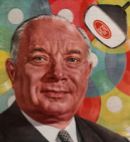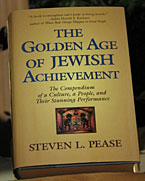Excerpt:
David Sarnoff©
"He was not an inventor, nor was he a scientist. But he was a man of astounding vision who was able to see with remarkable clarity the possibilities of harnessing the electron."
New York Times obituary of David Sarnoff
December 13, 1971
 By today's standards, Sarnoff's youth was insufferable. Left by his father, his mother handed him off to a distant relative to teach him Hebrew, Aramaic and the Talmud somewhere in the vast expanses of the Russian Pale. Next, he was relocated to the polyglot, teeming masses of New York's lower East Side, where he had to work to support his family while learning English and attending school. He was not yet ten. Sarnoff simply never had a childhood. Today, such trauma would be unthinkable. Counseling would be called for. But for Sarnoff, it helped spur the kind of dogged determination he demonstrated throughout his career as the leader behind two of the twentieth century's most influential mediums, radio and television.
By today's standards, Sarnoff's youth was insufferable. Left by his father, his mother handed him off to a distant relative to teach him Hebrew, Aramaic and the Talmud somewhere in the vast expanses of the Russian Pale. Next, he was relocated to the polyglot, teeming masses of New York's lower East Side, where he had to work to support his family while learning English and attending school. He was not yet ten. Sarnoff simply never had a childhood. Today, such trauma would be unthinkable. Counseling would be called for. But for Sarnoff, it helped spur the kind of dogged determination he demonstrated throughout his career as the leader behind two of the twentieth century's most influential mediums, radio and television.
Born February 27, 1891, in Uzlian, a Russian Shtetl near Minsk, David Sarnoff was five when his father, Abraham, left to pursue opportunities in America. That same year, his mother, Leah, parceled him out to a granduncle to study the Talmud in hopes he would become a rabbi. Four years later, with his mother and younger brothers, he immigrated to America in the cheapest steerage available. It took them through Latvia, England, and Canada en route to New York where months later, they would rejoin their ailing father.
Abraham's worsening tuberculosis would kill him ten years later, but in 1900, it meant David had to go to work immediately to help the family survive. Nine years old, he began selling Yiddish newspapers before and after school (and choir practice). He attended both day and night school and grabbed discarded English language newspapers to teach himself English. Ever the go getter, by 1904, Sarnoff had saved $200, bought his own newspaper stand, and put his siblings to work with him.
His formal education ended in 1906 when his father's deteriorating health meant he had to work full time. He wanted a job at a newspaper, but went through the wrong door and ended up as a messenger for an undersea cable company. Three months later, refused time off to sing in his choir for Rosh Hashanah and Yom Kippur, he either quit or was fired (sources vary). But by then he knew something about telegraphy. The possibility of becoming a telegraph operator drew him to American Marconi Wireless Company where he started as an office boy....
